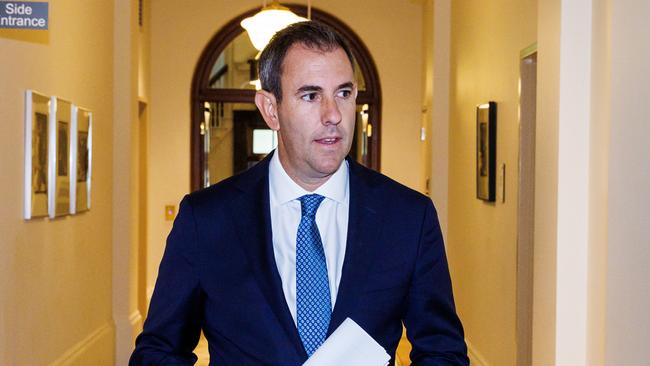Tax cuts still on the table, says Jim Chalmers
Jim Chalmers says he has no plan to scrap or scale back the legislated stage three tax cuts, after the IMF said there could be a case to ‘reassess’ tax relief for middle and high income earners.

Jim Chalmers says he has no plan to scrap or scale back the legislated stage three tax cuts, after the International Monetary Fund said there could be a case to “reassess” the tax relief for middle and high income earners if needed.
The Treasurer has come under pressure from social welfare groups, the Greens and a number of economists to ditch the cuts, which come into effect from mid-2024 and are expected to cost the budget more than $250bn in lost revenue over the following decade.
The IMF’s report card on the Australian economy, released Wednesday night, advocated for “comprehensive tax reform” and to review “large spending programs”, making specific mention of the NDIS.
But Dr Chalmers on Thursday said the Albanese government’s current ambitions for shoring up the tax base did not extend beyond measures to crack down on multinational corporate tax avoidance.
“Our policy hasn’t changed on the stage three tax cuts,” he said.
“When you want to fund these big either unavoidable or desirable pressures on the budget, then you need to find a way to pay for them, and that will be a combination typically of spending restraint, savings in the budget and responsible tax changes,” he said.
“We value as a government the ability to provide good healthcare, to provide good disability care, and that costs money, and we need to make sure that we’ve got the tax base to sustain that.”
Dr Chalmers said changing the capital gains treatment of the family home was also “not something that we’ve been working up or considering”.
“We’ve indicated our priorities when it comes to tax – multinationals are our priority and compliance with the existing tax laws as well. That is in accord with what the IMF is saying,” he said.
“If there are avenues for responsible tax reform into the future, like what we’re doing in multinationals, then obviously those opportunities and avenues should be explored.”
Dr Chalmers said his push for a new “sustainable finance architecture”, including labelling the climate impact of different investments, would not add an extra layer of bureaucracy for business, who are already under pressure to adopt ambitious climate change targets from climate focused investors.
“It is not another layer of bureaucracy, I want to make that clear,” he said.
“This is about better designed and better informed markets. I spent a lot of time in the boardrooms of this country speaking with big investors, including big institutional investors, and they want to see some clarity and some consistency when it comes to the disclosure. Not just of the climate risks in our business sector, but also the ways that businesses are grabbing the opportunities of changing sources of energy.”
Dr Chalmers in a recent essay outlined his vision for a move towards a values-driven economy, with an emphasis on how government can help promote investment in areas that produce social as well as economic gains. That included forcing companies to better articulate and disclose nature-related risks and biodiversity goals in a standardised fashion to help investors support businesses with ambitious climate targets.



To join the conversation, please log in. Don't have an account? Register
Join the conversation, you are commenting as Logout